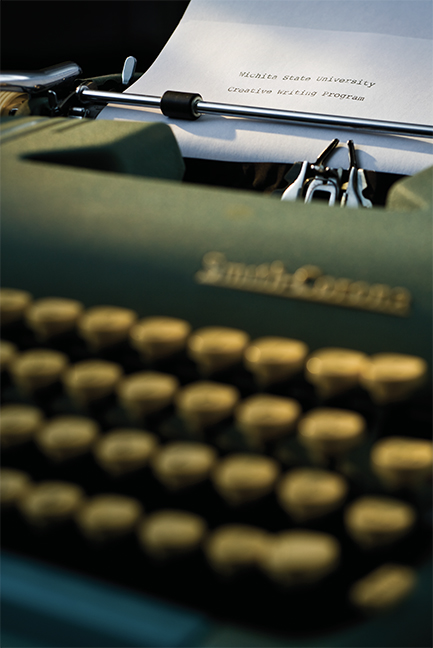
The manual typewriter wasn't such a rarity 35 years ago when the Master of Fine Arts in creative writing program was established at WSU. Today, the program – among the oldest in the nation – offers serious, aspiring writers an apprenticeship in writing fiction, poetry and nonfiction, enciched by the study of literature.
And there's nary a typewriter in sight.
Except, that is, for the one Albert Goldbarth uses. Goldbarth, WSU’s Adele M. Davis distinguished professor of humanities (who avoids computers as avidly as weak metaphors, and first writes out his poems and essays longhand) is the only poet to win the National Book Critics Circle Award twice.
He is one of the program’s faculty lures.
Others are award-winning fellow poets Jeanine Hathaway and Margaret “Peggy” Rabb, who directs the program, and critically acclaimed fiction writers Margaret Dawe, Richard Spilman and Steve Hathaway.
“I fell into the creative writing program at WSU by accident when I took a summer course from Steve Hathaway. What I learned in that class proved to be true throughout my experience there: that the people make the program,” says Randy Phillis ’80/85, who teaches creative writing, American literature and composition at Mesa State College, Grand Junction, Colo.
He is the author of two poetry collections, A Man Explains His Posture and Kismet, Colorado. “The faculty at WSU was top-notch, and I was attracted to them not only as mentors, but as wonderful, generous human beings.” Denise Low ’84, former Kansas poet laureate, agrees: “Phil Schneider taught me how to run a workshop. I still love it when I see Jeanine Hathaway or Anita Skeen, and I have fond memories of their attention, focus and kindness. And Ben Santos was there when I was, also Tony Sobin. Maybe what I am saying is I recall the people who made up the program, how generous they were with their time.”
Every academic year since the program’s founding, a core of permanent faculty members, plus distinguished visiting writers, have provided students tutorials, master class seminars and workshops. The 48-semester-hour program ends with a comprehensive exam based on an individualized reading list and the submission of a book-length thesis in poetry, short fiction, the novel or some other appropriate form. The program is personalized and designed, as the program description puts it, “to maximize each student’s writing potential.”
The program’s goal also can be described the way fiction writer and former program director Philip H. Schneider, WSU emeritus professor of English, explains the role of an effective editor: “A close editor is the person who attempts to make what is there better — not change the style but to make what is better reveal itself.”
Unlike some creative writing programs that rely solely on studio work, WSU’s employs additional course work in English to develop writers who are also able to hone skills useful in teaching, editing and other areas. This dual studio and academic focus was built into WSU's MFA by poet Bruce Cutler, the program’s founder and first director, and by Schneider and Michael Van Walleghen.
Van Walleghen, a poet, and Schneider, who arrived at WSU in 1967 with an MFA from the University of Iowa, worked with Cutler to pen an MFA proposal based on Iowa’s that was eventually accepted by the Kansas Board of Regents and established at WSU in 1974.
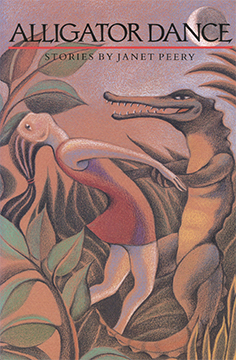
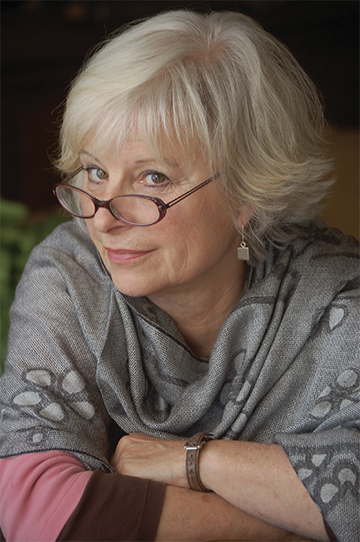
of Alligator Dance, The River
Beyond the World and What the
Thunder Said. A professor at Old
Dominion University, she has
won many honors for her fiction
and teaching.“I’ve made my
grad school studies sound like
part book-learning and part
boogaloo,” she says. “Maybe
they were ...”
“Bruce recognized the opportunity that lay in the
creation of the program, since there was no other
in the region,” says Don Wineke, chair of WSU’s
English department. “Moreover, he wished to make
the program unique: aware that graduates were probably destined to make their livings at something other than fiction and poetry writing, he oversaw the design of a program that included an immersion in
the study of literature. It was designed from the first
as a studio-academic program.”
That formula has proven successful, as more than
300 graduates of the program are now professionally plying their craft, whether they are writing, editing, teaching or using the education gained at Wichita State in fields outside the discipline.
Among this cadre of grads is Robert Graves ’02/05. His program work grounded him in theory and literature, which is, he says, one of the reasons WSU’s program “is underrated nationally.
The three-year, studio-academic format set me up to either find work in the
field or to continue my education. I chose to continue on for a Ph.D. in English with a specialization in rhetoric and writing at Bowling Green, which I just completed this past summer, and I found that WSU had prepared me well for the challenge.”
April Pameticky ’06 is also pleased with the program’s format. “I had to educate myself on the style of programs available at other universities before I could appreciate the uniqueness of a graduate degree in creative writing that emphasized studio-writing sessions without cutting out critical theory,” she says. “Many two-year MA programs were springing up, but they didn’t have the academic emphasis I needed. Those programs tended to shave off hours on the literary-studies half. I believe that waters down the writing workshops. How can we write if we don’t read?”
Pameticky teaches language arts at a Wichita middle magnet school. “I always wanted to be a teacher,” she reports. “While some might argue that I am not using my MFA — Professor Schneider would laugh at that: education is education not employment — I feel strongly that the impact I make on these adolescent writers matters.”
Kerry Jones ’00, a fiction writer and director of WSU's writing center, tells the story of how she came to Wichita State: “At the time, 1997 to 1998, I was in an MA program in creative writing at a university in Philadelphia. I’d never wanted an MA, really. I’d wanted an MFA since that’s a terminal degree. I wanted to write, but more than that, I wanted to teach college.
“It’s typical for English departments to advertise other programs, and on one snowy and dismal Philadelphia afternoon, I stepped out of Temple’s English department and noticed an ad for WSU's MFA program — ‘Out in the Middle of Somewhere.’ That sounded pretty good to this depressed Pennsylvania girl, so I sent away for application materials. This would mean moving from Pennsylvania to Kansas, and, in my right mind, I knew there was no way
I was ever going to do that.
“But I’d researched the faculty at WSU and had been impressed with the likes, especially, of Richard Spilman, Margaret Dawe and Philip Schneider. When I got accepted, I was happy, but still — move to Kansas? I got a call from Richard Spilman, the head of the creative writing program then, asking why I hadn’t applied for a GTA-ship,
so I did. Financially and creatively, it was a done deal. I couldn’t wait to come to WSU, and I haven’t regretted it.”
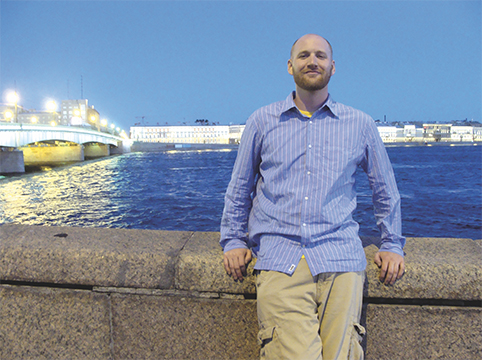
at Cowley College, Arkansas City, Kan.,
is pleased, he says, to be able to “recycle
my gained WSU knowledge back to
students.” He also enjoys writing, working
to improve his fiction and analyzing movies.
He has turned his knowledge about film into
the book The Brothers Coen: Unique
Characters of Violence. “The best part is,”
he says, “I feel as if I’ve only just started.”
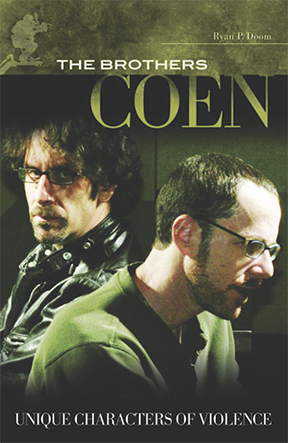
Jason Harper ’06, a former counselor,
“found WSU through a Google search. I
was working in social services, but wasn’t
sure I wanted to stay in that field. After
looking at several programs listed online,
I asked a former professor about WSU's
MFA program. I am happy I did. It was
a training ground for teaching, editing,
writing — and outright hard work.
“The program could be as much as the
grad student wanted it to be; I wanted it
to be a program to gain background and experience that could send me on the way to where I wanted to go. It did. I’m teaching full-time for a state university, have edited three published books, made a promotional video for a Random House author, will have my own novel — my MFA thesis — Yellow #5, published next year and am working on its follow-up, Red 40.”
Ryan Doom ’01/05, a fiction writer who has just had his nonfiction work The Brothers Coen: Unique Characters of Violence published, says he learned something unique, valuable and inspirational from
every one of his creative writing and English department professors.
“Dr. Hathaway always found a way to spark interest in a story and keep things grounded in reality,” he says. “Professor Dawe provided the much needed psychological and technical elements that fiction requires. Professor Schneider intimidated with a single look and gave rookie writers the fear that everyone should experience in order to accept and thrive from criticism. And Professor Spilman, my thesis advisor, always encouraged and remained willing to work on a story no matter how lackluster or far off my stories were."
Rabb, Spilman, Schneider and Cutler have been noted as serving as program directors. Steve Hathaway and Anthony “A.G.” or “Tony” Sobin are two others.
Completing the total of seven is Rick Mulkey ’92, a poet and director of creative writing at Converse College, Spartanburg, S.C. It was WSU’s faculty and visiting faculty that first drew Mulkey to Wichita. “When I arrived, WSU had Albert Goldbarth, Tony Sobin, Anita Skeen and Jeanine Hathaway teaching poetry workshops,” he says. “They were all fantastic teachers and mentors and marvelous writers. Plus, the program attracted excellent visiting faculty for the writer-in-residence program. In addition to the core faculty, I had opportunities to work with Bin Ramke, Jay Meek and Jack Myers.”
Low says she also benefited from the visiting writers “who would parachute in for an intensive month. The one-on-one with them made me feel like a serious writer.”
Each year the MFA program and the English department host a series of visiting writers who join workshops, offer seminars and give readings on campus and in the wider community. In addition, two visiting distinguished writers-in-residence each spend a month on campus, where they join the intellectual life of the program, work with students individually during weekly tutorials and conduct informal seminars.
This year, the novelist and former literary editor of Esquire magazine Stephen Amidon is the writer-in-residence through Oct. 9, and poet Joy Katz will be on campus March 22 to April 16, 2010. Past visiting writers include, from A and Z only, Lee Abbott, Renee Ashley and Paul Zimmer. (Sorry, but the complete list would take at least a column.)
Mulkey, who served as program director from 2006-07, has accumulated “many wonderful memories” from both his student and teaching days. “Some of them are very simple,” he says, “for instance having dinner and a cigar and talking poetry with Albert Goldbarth, or talking travel writing with Jeanine Hathaway over a Lebanese lunch, or fishing and camping with Steve Hathaway, Brian Hay and Chris Brooks, or Thanksgiving dinner at Margaret Dawe’s home. The program has always had good people.”
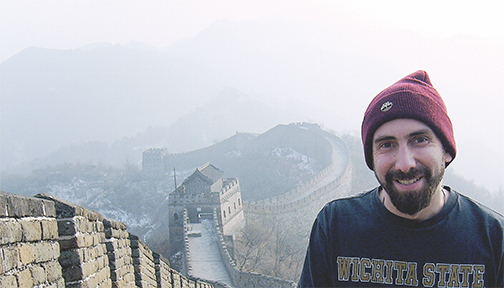
Cuisine 101. Visit chinesecuisine101.
weebly.com
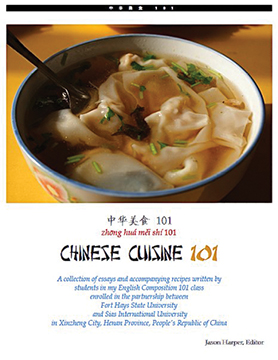
Janet Peery ’75/92 is a fiction writer and professor of English and creative writing
at Old Dominion University in Norfolk, Va.
“I count myself lucky to have studied with
such writers and scholars as James Lee
Burke, Albert Goldbarth, Anthony Gythiel,
Steve Hathaway and Phil Schneider,” she
says. “Students worked hard, as our
professors held us to high standards, but
we had fun, too. Outside the classroom,
some of my fondest memories are of packed-house readings at Watermark Books, after-hours at Kirby’s, riotous dancing at the old Coyote Club on North Broadway and Jim Burke taking our workshop to the Blue Note to hear Clayton Chenier and the Red Hot Louisiana Band.”
Michele Battiste ’04, a poet who has taught workshops for Gotham Writers Workshops in New York City and at the American School in Budapest, Hungary, is pursuing her Ph.D. and teaching at the University of Colorado at Boulder, where she’s focusing on 19th and 20th-century working-class American poetry and poetics.
Battiste came to Wichita State to study with Goldbarth.
“I left San Francisco to come to WSU — a great sacrifice I thought at the time, though I came to love Wichita even more than San Francisco,” she says. “Two creative writing faculty members were pivotal in my development as a poet: Albert Goldbarth and Jeanine Hathaway. Albert is such a big personality, encyclopedic in his knowledge, demanding of his students, that I was always super revved up in his presence, jumpy, itchy, raring to go and desperate to prove myself. With Albert, I was always driven. Jeanine forced me to be more contemplative, to pull away from the poems I was writing and the poems I was reading and to think about the work. Jeanine showed me how space and time and a deep breath could work wonders for a poem and a poet.”
Music journalist, public radio newswriter and host Jedd Beaudoin ’01, who is now studying public history at WSU, says that “Richard Spilman, Steve Hathaway and Philip Schneider each had unique perspectives on writing.
“Phil, in particular, didn’t teach me how to write as such, he taught me how to read in the way that writers need to learn how to read and never offered anything less than his honest opinion. He didn't just teach me, or any of the other students, about writing, he taught us about life. I'm thankful for the people I met during my time in the program and what I learned from each of them."
T. Cole Rachel ’00 is the author of two poetry books, is a contributing editor at Visionaire and Interview Magazine and is at work on a collection of essays.
“My experience at WSU gave me an insight into the realities of publishing, which can be depressing, to be honest,” he says. “But it also gave me the courage of my convictions. I left with a confidence that I might have never had otherwise. I moved directly from Wichita to New York City and set off on my career as a poet. Ironically, I now make a living as a journalist, but I’ve never taken a single journalism class. Still, I feel like my experience at WSU prepared me for the rigors of being a working writer.”
Jodi Drinkwater ’96/00 has had her poetry published in various small presses and literary journals. Her chapbook is called Blood and Water. She also writes short works of fiction, plays and screenplays and, when she’s not writing, she is a painter in Santa Fe, N.M.
“I was drawn to WSU’s writing program by the caliber of the poetry teachers,” Drinkwater says. “The two who have shaped my writing the most are Albert Goldbarth and Jeanine Hathaway. The former for his example of prolific creativity and passion for poetry, and the latter for her sensitivity and acuity in the craft of writing.

collection of poetry.
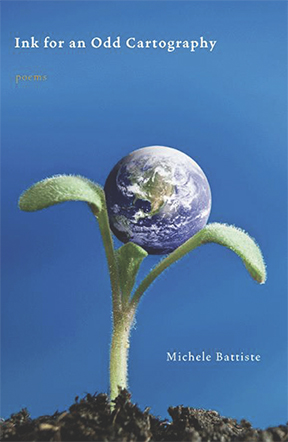
“I dreamed of attending the program
because I had a romanticized view of
the life of the writer and poet and wanted
that for myself. By the time I graduated,
my feet were firmly planted in reality, but
in my heart was also planted an ever-increasing, realistic love of writing.”
Descriptions of WSU’s creative writing
program vary. Goldbarth, for instance,
told Jim Lehrer during a recent PBS
interview that it is“a well intentioned,
sleepy little MFA program.”
Schneider agrees. “It’s an accurate description,” he says. “It is well intentioned, and ‘sleepy’ in that we’re not saying in 10 years we’re going to be the best program. That’s not realistic. When we started, there were 13 MFA programs in the nation. There are now literally hundreds.”
Pameticky says, “I think many in the Wichita community do not appreciate the caliber of the program compared to other programs around the country. I think that so many students travelling from so many different places, all vying for the opportunity to study here, speaks for itself. But it’s a quiet program, very understated, just churning out writers."
Battiste describes the program as “eclectic. It’s a hoot. It's invigorating. I appreciated the community of students and faculty — everyone writing differently, thinking differently, sometimes arguing, sometimes even hotly, but coming together at the end of the week to have a drink and just enjoy writing."
And Peery’s take on it is this: “I’ve made my grad school studies sound like part book-learning and part boogaloo. Maybe they were …”
However many different voices describe Wichita State’s MFA in creative writing, the program at its essence speaks to this: wordcraft.





